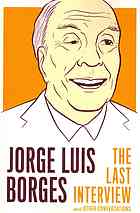
Jorge Luis Borges
The Last Interview: and Other Conversations
کتاب های مرتبط
- اطلاعات
- نقد و بررسی
- دیدگاه کاربران
نقد و بررسی

November 1, 2004
The first volume in Planeta's new line of bilingual (English-Spanish) books presents Borges's autobiographical notes, which were originally published in the New Yorker on September 19, 1970. In them the acclaimed Argentinean poet and cuentista shares wonderfully ruminative reflections on his life and on the historical events that shaped his writing. Born to a kind but philosophically anarchistic lawyer and a genteel woman of Argentinean and Uruguayan stock, the frail Borges was gently, but firmly, pushed towards a literary career at an early age. He bluntly notes, "It was tacitly understood that I had to fulfill the literary destiny that circumstances had denied my father"--the "circumstances" being blindness, a handicap that would later afflict Borges himself. Seamlessly weaving his bookish influences into his narrative, the wordsmith's childhood memories often read more like an annotated bibliography than an autobiography. It seems oddly impersonal at times, though the author's humble outlook on life remains above reproach. Borges first began writing at the age of six and published his first poem at 19, but he is quick to criticize his own work and speaks candidly about his failed experiments. For example, he dismisses his second volume of poetry Luna de enfrente (Moon Across the Way) as a "riot of sham local color" filled with "tomfooleries" like spelling his first name "Jorje" and omitting the "d" in words like ciuda. He also shares humorous anecdotes at his own expense, recounting, for example, how he surreptitiously slipped volumes of his poetry into the coat pockets of magazine editors. Succinct and measured, Borges's writings breeze over any non-literary adventures (there is no mention of his marriage to half-Japanese wife Maria Kodoma), but the picture that he presents is nonetheless mesmerizing.

























دیدگاه کاربران